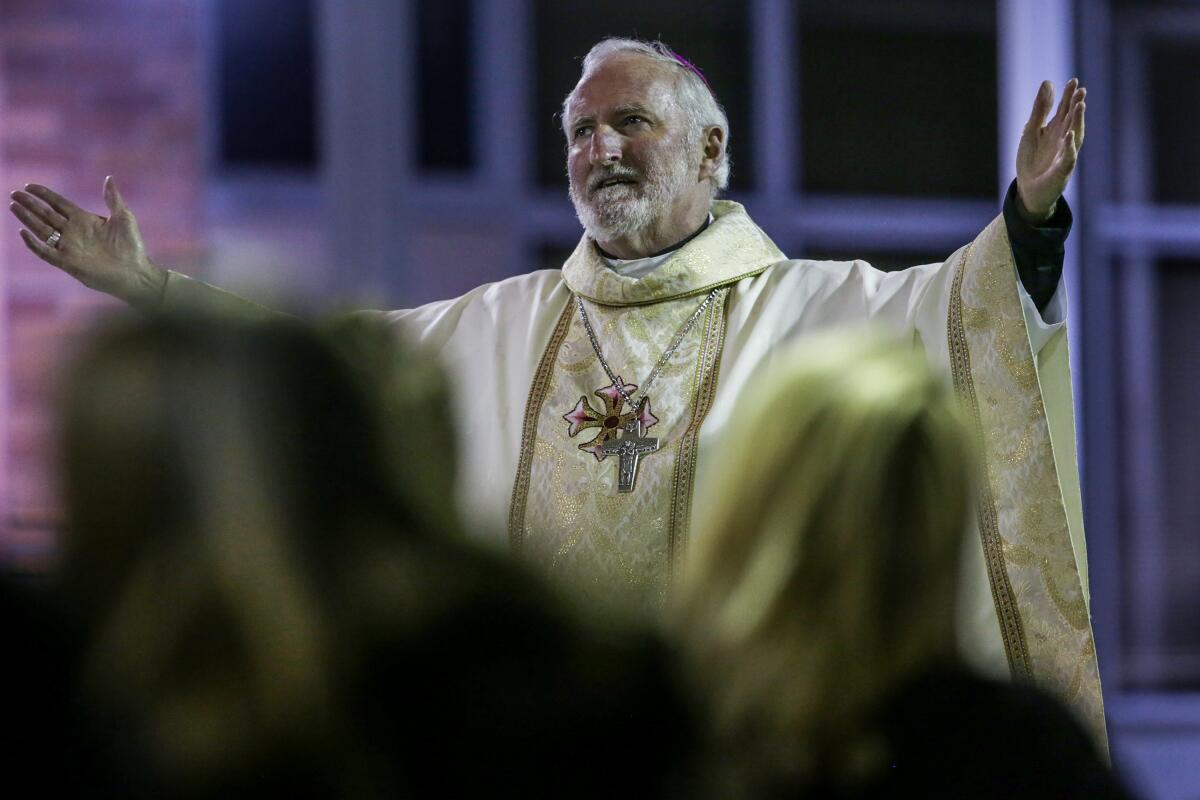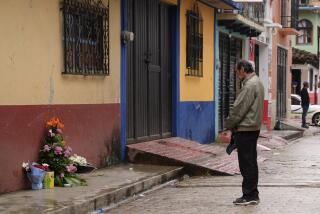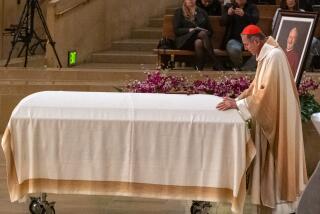Los Angeles bishop’s death is being investigated as a homicide, authorities say

- Share via
The shooting death of Los Angeles Auxiliary Bishop David O’Connell — known as a “peacemaker” — is being investigated as a homicide, sheriff’s officials said Sunday.
“This incident is being handled as a murder investigation,” the L.A. County Sheriff’s Department said in a brief statement. “There is no additional information available at this time.”
Sheriff’s deputies responding to a medical emergency call found the body of O’Connell, 69, who served as a priest and bishop in L.A. County for nearly half a century, at a home in the 1500 block of Janlu Avenue in Hacienda Heights around 1 p.m. on Saturday, authorities said.
He had suffered a gunshot wound and paramedics pronounced him dead at the scene, sheriff’s officials said.
“We are deeply disturbed and saddened by this news,” Archbishop José H. Gómez of the Roman Catholic Archdiocese of Los Angeles said in a statement Sunday. “Let us continue to pray for Bishop Dave and his family. And let us pray for law enforcement officials as they continue their investigation into this terrible crime.”
In an earlier statement, Gómez described O’Connell as “a peacemaker with a heart for the poor and the immigrant, and he had a passion for building a community where the sanctity and dignity of every human life was honored and protected. He was also a good friend, and I will miss him greatly. I know we all will.”
O’Connell earned the title of bishop in 2015, according to the archdiocese’s website.
About a dozen people held candles and stood near the intersection of Janlu and Los Robles avenues around 9 p.m. Saturday and prayed the rosary next to police tape. Glendy Perez said she knew O’Connell from antiabortion rallies in the area and described him as a “soft-spoken and loving” man.
Jonny Flores, a Rowland Heights resident who also knew O’Connell from rallies, said the bishop was always generous with his time, no matter how small a parishioner’s request might be.
“He didn’t hold back his words. He was well spoken,” Flores said. “He would take the time. He was very humble. He was never too busy.”
According to a statement from the archdiocese, O’Connell, who was born in 1953 in County Cork, Ireland, was named an auxiliary bishop for the archdiocese by Pope Francis in 2015. He studied for the priesthood at All Hallows College in Dublin and was ordained to serve in the archdiocese in 1979.
After ordination, he served as associate pastor in several parishes and as pastor at St. Frances X. Cabrini, Ascension, St. Eugene and St. Michael’s parishes, all in L.A. He was the chairman of the interdiocesan Southern California Immigration Task Force, helping coordinate the church’s response to immigrant children and families from Central America in recent years, and was key in sponsoring the enrollment of several young immigrants in Catholic schools — several of whom have advanced to college.
For 14 years, O’Connell was pastor at St. Frances X. Cabrini, in South Los Angeles, and became pastor of nearby Ascension, the Times reported in 2002. This meant overseeing not only two congregations of roughly 4,000 families each, but also two schools that between them serve about 500 pupils in kindergarten through eighth grade.
“Both neighborhoods are very poor and bogged down by issues of survival, and so are the duties of their priest,” the Times reported. “O’Connell spends a lot of time encouraging his parishioners to speak up for themselves — to fight for new stop signs and safer playgrounds, to demand that politicians keep their promises.”
O’Connell gained his reputation as an intermediary after the 1992 riots following the acquittal of the police officers who savagely beat Rodney King, according to the Catholic News Agency, which reported that the future bishop was instrumental in trying to rebuild trust between officers and communities in South L.A.
“Right away, we said that our churches were open for people, if they had taken stuff, to bring it back,” he said at the time. “People brought things back, and we tried to give them to the stores which they had come from.”
More to Read
Sign up for Essential California
The most important California stories and recommendations in your inbox every morning.
You may occasionally receive promotional content from the Los Angeles Times.











